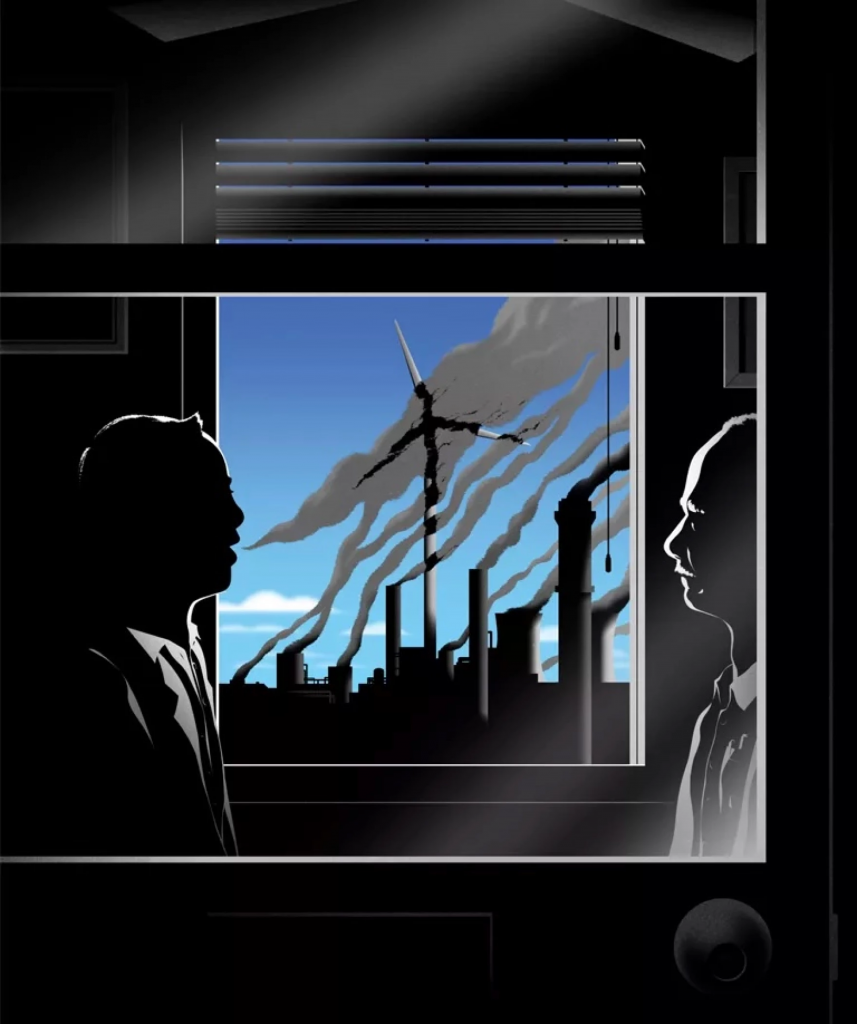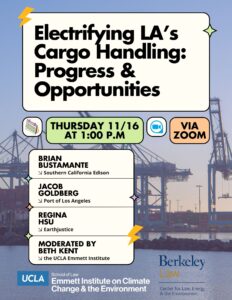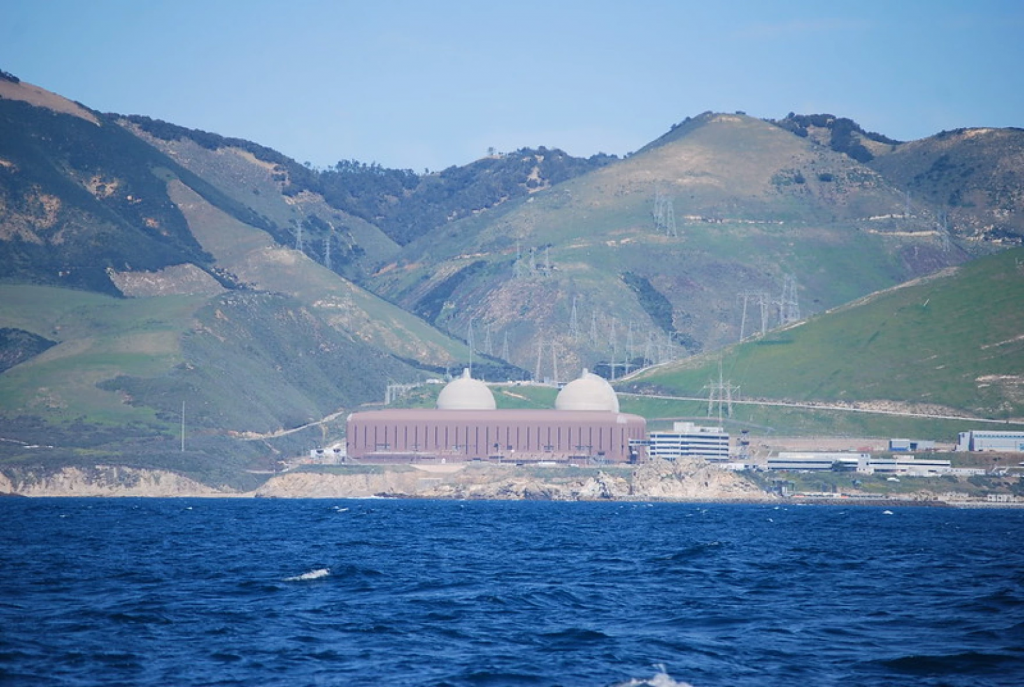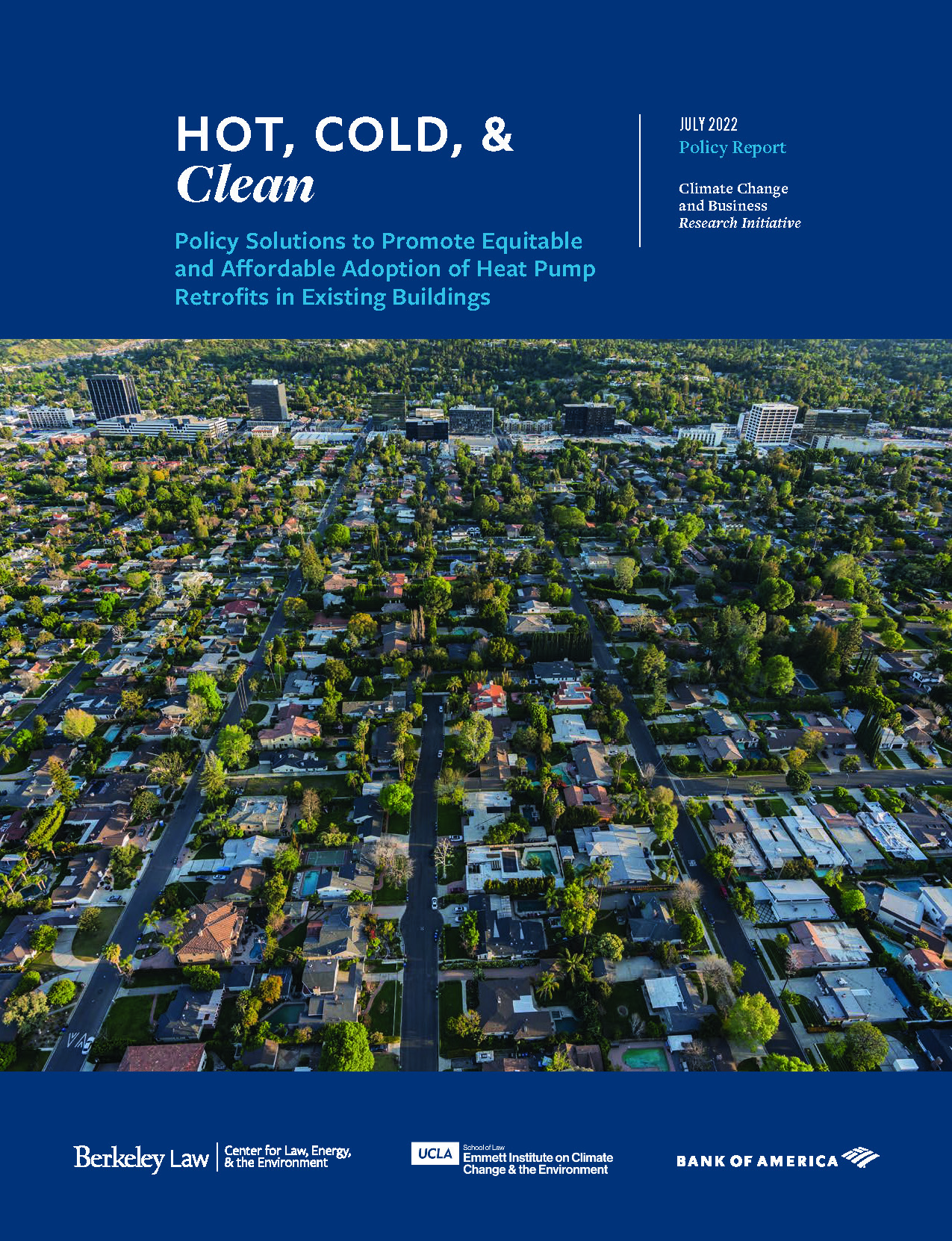
I’m guest hosting Your Call’s Media Roundtable this morning at 10am PT. First, we’ll discuss the coordinated campaign by fossil fuel interests and their allies to sow disinformation about renewable energy. I’ll interview Rebecca Burns, an award-winning investigative reporter who has covered this story extensively.
Then, we’ll discuss the one-year anniversary of the civil war raging in Sudan. Joining me will be Sudanese-American journalist Isma’il Kushkush, who has reported on the conflict from the beginning.
Tune in at 91.7 FM in the San Francisco Bay Area or stream live at 10am PT. What comments or questions do you have for our guests? Call 866-798-TALK to join the conversation!

The Ports of Los Angeles and Long Beach are major polluters in the region but also potential models for climate action — if they can electrify their equipment, from fork lifts to cranes. A new report released by UCLA Law’s Emmett Institute on Climate Change and the Environment and UC Berkeley Law’s Center for Law, Energy & the Environment (CLEE) —A Heavy Lift: Policy Solutions to Accelerate Deployment of Zero-Emission Cargo Handling Equipment at the Ports of Long Beach and Los Angeles and Beyond—surveys the biggest obstacles to speedy electrification and makes some recommendations.
Greenhouse gas emissions at the Ports come from three main sources: ships, heavy-duty vehicles, and cargo handling equipment (“CHE”). Cargo handling equipment is the third largest source of emissions accounting for approximately 14 percent of the Ports’ total greenhouse gas emissions. The Ports have replaced some fossil-fuel powered equipment with zero-emission models as they work toward goals set forth in their Clean Air Action Plan, including a goal to transition to 100 percent zero-emission CHE by 2030. However, more work is needed to fully transition the Ports large CHE fleet to zero-emission models. While some consider cargo handling equipment the “low hanging fruit” of port emissions reductions, there remain challenges for the transition to zero emissions. Some of the needed ZE technology is still being developed, and communities and workers have raised concerns around the potential for job loss.
To address these concerns, the law schools hosted a convening of experts from a variety of industries, including environmental, public health, environmental justice, labor, business, and government sectors. We discussed the challenges and opportunities of decarbonizing cargo handling equipment at the Ports. The report discusses the top barriers to transitioning to electric CHE models and proposes solutions to overcome these barriers.
The report dives into the following barriers:
- Inadequate grid and charging infrastructure to support zero-emission cargo handling equipment and lack of substantial planning and funding to install necessary and timely infrastructure.
- Evolving zero-emission technology for some types of cargo handling equipment and high upfront costs.
- Fear among communities and workers of job loss and of increased emissions from expanded port activities.
The report then recommends several solutions, including:
- The Ports and utilities, chiefly Southern California Edison and Los Angeles Department of Water and Power, could proactively deploy “no regret” infrastructure, including increasing grid capacity and upgrading distribution networks that will be needed regardless of how zero-emission cargo handling equipment is powered.
- The California Legislature; the Air Resources Board; and/or the South Coast Air Quality Management District, using their existing authority grounded in air pollution control, could create technology-forcing mandates and clear, enforceable implementation deadlines, with penalties for non-compliance, to catalyze the zero-emission cargo handling equipment transition. Where technology is not readily commercially available, regulations could incorporate adequate flexibility and sufficient lead time for entities to meet the mandate.
- State and local government could implement policies to promote job preservation, local job creation, and worker training, such as programs that encourage ports and terminal operators to partner with local training organizations to upskill and reskill the workforce to use the new vehicles and technologies.

Given the importance of the Ports to worldwide commerce, they could help inform climate action at ports around the globe, if they and policy makers can collaborate to achieve these zero-emission goals.
If you want to dive into this topic further, join us for a webinar discussion today, Thursday, November 16th at 1pm PT when we’ll discuss solutions with panelists from Southern California Edison, the Port of Los Angeles, and Earthjustice (RSVP here).
This report is ultimately part of a series on business solutions to address climate change. Read more: A Heavy Lift: Policy Solutions to Accelerate Deployment of Zero-Emission Cargo Handling Equipment at the Ports of Long Beach and Los Angeles and Beyond.
This post was co-authored by Beth Kent and Gabi Rosenfeld.
 It’s a double shot of me on KALW radio today, where I’ll be hosting Your Call at 10am PT and then State of the Bay at 6pm PT for our second edition of our climate special series.
It’s a double shot of me on KALW radio today, where I’ll be hosting Your Call at 10am PT and then State of the Bay at 6pm PT for our second edition of our climate special series.
First, on Your Call’s One Planet Series at 10am PT, we’ll discuss a joint investigation by The Washington Post and The Examination about how the food, beverage and dietary supplement industries are paying dozens of registered influencer dietitians to help sell products and deliver industry-friendly messages on social media platforms. Joining us will be:
- Sasha Chavkin, correspondent for The Examination
- Dr. Caitlin Gilbert, neuroscientist and Well+Being data reporter at The Washington Post
Then at 6pm PT on State of the Bay for our second climate special, you can hear my interview with with California Attorney General Rob Bonta about the state’s lawsuit against big oil for climate damages.
Then, many Bay Area cities have formally declared a climate emergency, but what does this mean, and what should it mean? We’ll discuss what tradeoffs and changes may be needed to address climate change in the Bay Area with:
And finally, we sit down with local educator, organizer, artist and activist, Khafre Jay to learn why he thinks the climate movement needs more Hip Hop.
Tune in at 91.7 FM in the San Francisco Bay Area or stream live at 10am PT for Your Call and then again at 6pm PT for State of the Bay. What comments or questions do you have for our guests? Call 866-798-TALK to join the conversation!
Join us tonight for State of the Bay’s inaugural “climate special.” We’ll hear about new and proposed climate legislation in California, discuss Bay Area cleantech startups and enjoy climate comedy.
First, we’ll talk with State Senator Josh Becker, representing the residents of California’s 13th Senate District, about climate legislation in California.
Then we’ll hear how Bay Area companies are innovating to create a cleaner, greener future for our state and beyond, even as some tech companies are choosing to move away from this region. Joining us will be Lora Kolodny, tech and climate reporter for CNBC, and Abe Yokell, managing partner and co-founder of Congruent Ventures.
And finally, we’ll laugh along with comedians Brad Einstein and Kyle Niemer, members of the inaugural climate comedy cohort created by Generation180 and the Center for Media & Social Impact. They’re goal is to inject humor into the climate change conversation.
What would you like to ask our guests? Post a comment here, tweet us @StateofBay, send an email to stateofthebay@kalw.org or leave a voicemail at (415) 580-0718.
Tune in tonight at 6pm PT on KALW 91.7 FM in the San Francisco Bay Area or stream live. You can also call 866-798-TALK with questions during the show.
Climate change news is often quite depressing, with frequent stories on the science and ever-worsening impacts. What gets lost in this otherwise important coverage is the amazing and inspiring tales of innovation and solutions happening all around us, in every sector and walk of life.
That’s why Berkeley Law’s Center for Law, Energy and the Environment (CLEE), in partnership with the UC Berkeley School of Journalism, launched the podcast Climate Break, which tells stories of climate solutions in less than two minutes. Climate Break features interviews with compelling scientists, innovators, organizers, and leaders discussing breakthroughs, new approaches, and examples of progress on climate change. And it’s almost entirely student run.
Over the past two years, we have recorded interviews with climate leaders like former California governor Jerry Brown and Arizona governor (and former Homeland Security secretary) Janet Napolitano, youth activists protesting fossil fuels, corporate leaders pushing for proactive climate lobbying, and entrepreneurs building clean energy facilities in tribal communities and retrofitting internal combustion engine vehicles in Egypt into electric models, among many other solutions.
And as of this year, a new episode of the podcast airs every Thursday on NPR-affiliate KALW 91.7 FM in San Francisco, offering listeners “climate solutions in a hurry.” In fact, you can tune in or stream live today at 7:19am and 3:48pm PT to hear our newest episode. We hope to expand to more radio stations soon.
For more on the podcast and its origins, Berkeley Law News profiled me and CLEE Project Climate Director Ken Alex, who had the idea for the program. Ken also serves as the show’s executive producer, along with CLEE senior climate fellow Chandra Middleton, who supervises the student team that helps produce the clips and draft additional information on each topic on our website.
So if you’re looking for inspiring solutions to address the climate crisis in less than two minutes, subscribe to Climate Break today on our website or wherever you get your podcasts!

Car sales data from 2022 is now out, and the results are encouraging. According to the Wall Street Journal, automakers sold 807,180 fully electric vehicles in the U.S. last year, or 5.8% of all vehicles sold, up from 3.2% a year earlier. And as E&E News reported (paywalled) 19 percent of new car purchases in California were zero-emission vehicles. This is a big increase from the 12 percent in 2021, according to the same California Energy Commission data, and a positive trajectory to a state-mandated goal of 100% zero-emission vehicle sales by 2035.
But only one EV company dominates. Tesla Motors accounted for 65% of total EV sales last year, down from 72% in 2021, but with no real competition in sight. Ford Motor Co. is a distant number 2 in sales at just 7.6% of the U.S. market, with Hyundai and affiliate Kia combined at third with 7.1% market share. In California, the top vehicles sold overall by a large margin were the Tesla Model 3 followed by Model Y, with combined sales of more than half of all EVs sold in the state. What’s more, Tesla earns large profit margins per vehicle compared to other automakers.
Other legacy automakers appear to be asleep at the wheel (so to speak). They are instead largely committed to making money on gas guzzlers, despite press releases and limited EV releases to the contrary. General Motors, for example, is allocating only 10% of a new $860 billion investment into EV development, according to Eletrek.
But not everyone thinks Tesla’s lead will continue. As Paul Krugman wrote in December after a stock price drop:
[I]t’s hard to explain the huge valuation the market put on Tesla before the drop, or even its current value. After all, to be that valuable, Tesla would have to generate huge profits not just for a few years but in a way that could be expected to continue for many years to come.
He cited the lack of obvious attributes that would give Tesla the kind of market dominance that we see with monopolistic companies like Apple or Google in their sectors.
But what Krugman and others miss is the significant technological advantage Tesla has right now over its competitors, in terms of charging speeds and user friendliness of the vehicles (Krugman admits he’s not a “car guy” and so likely hasn’t test driven EVs from different brands before to understand this difference).
But second, and perhaps most importantly, people like Krugman mistake Tesla as just a car company. But it’s not. It’s a fuel station operator, too, with the most significant build out of EV charging infrastructure in the world. What’s more, compared to the competition (third party charging companies rather than other automakers), Tesla’s chargers are higher-powered and more convenient and reliable.
But wait there’s more, as they say on the game shows. Tesla is also an energy storage company, with 152 percent growth last year in its stationary battery business. And it’s a solar roof company, though that latter business has largely been stalled in recent years. So when you package all of these business lines together, you’ll find a vertically integrated monopoly with a significant head start in essentially all of the climate-fighting tech that will dominate the future.
Yes, Tesla stock may be overvalued. But the perception behind it is quite justified. Other automakers need to catch up, as the 2022 sales data reveal, or they will face an existential threat to their survival — much as humans now do, thanks to their gas-guzzling products.

Tonight on State of the Bay, I’ll be hosting Jessica Wolfrom, environmental reporter for the San Francisco Examiner, for an update on San Francisco’s climate action plan. As my colleagues at CLEE analyzed in a report last year, the city may need up to $22 billion to meet its climate goals.
Then we’ll uncover the mystery and history of Alcatraz: the prisoners, protests, escapes and more. We’ll be joined by John Martini, author, historian and former Park Ranger on Alcatraz Island, and Karley Nugent, current Park Ranger on Alcatraz.
Finally, we’ll hear about another great bay area gem: The Pacific Pinball museum in Alameda, with Larry Zartarian, president of the Pacific Pinball museum.
What would you like to ask our guests? Post a comment here, tweet us @StateofBay, send an email to stateofthebay@kalw.org or leave a voicemail at (415) 580-0718.
Tune in tonight at 6pm PT on KALW 91.7 FM in the San Francisco Bay Area or stream live. You can also call 866-798-TALK with questions during the show.

I’ll be guest hosting today’s Your Call’s Media Roundtable, where we’ll talk about what the midterm election means for President Biden’s climate and clean energy agenda, including investments in alternative sources of energy that are clean, accessible, affordable and sustainable.
This topic is especially timely given the runoff election victory this week for Georgia senator Raphael Warnock, plus Arizona senator Krysten Sinema’s announcement this morning that she’s leaving the Democratic party.
Joining us will be:
- Marianne Lavelle, award winning reporter covering environment, science, law, and business for InsideClimate News
- Jason Mark, editor of Sierra and the author of Satellites in the High Country: Searching for the Wild in the Age of Man
Then at 10:30am PT, we discuss two cases in front of the Supreme Court this week that could have major impacts on LGBTQ rights and federal election rules. The case 303 Creative v. Elenis involves a challenge by a Colorado website designer to a state law that bars public-facing businesses from discriminating against gay people or announcing their intent to do so. The designer, Lorie Smith, argues that subjecting her to the law would violate her right to free speech. The justices also considered Moore v. Harper, a case that would give state lawmakers unfettered power to set rules for voting and elections, without state constitutional limits.
Joining us to analyze the potential impact of these two cases will be Mark Joseph Stern, a senior writer covering courts and the law for Slate Magazine. Mark has covered the U.S. Supreme Court, federal appellate and district courts, and state and local courts since 2013.
Tune in at 91.7 FM in the San Francisco Bay Area or stream live at 10am PT. What comments or questions do you have for our guests? Call 866-798-TALK to join the conversation!

Today I’m doing double duty on KALW 91.7 FM San Francisco Bay Area. First, at 10am PT, I’ll be guest hosting Your Call’s One Planet Series, where we’ll discuss ConocoPhillips’ massive oil and gas Willow Project in Alaska’s fragile western Arctic. Joining us will be Adam Federman, investigative reporter and a reporting fellow with Type Investigations, and the author of Fasting and Feasting: The Life of Visionary Food Writer Patience Gray.
Then in the second half of the program, we’ll cover the Biden administration’s recent $1.1 billion lifeline to California’s last nuclear power plant at Diablo Canyon. Sammy Roth, climate and energy reporter at the Los Angeles Times and writer of the weekly Boiling Point newsletter, will explain the situation.
Then on State of the Bay at 6pm PT, my co-host Grace Won will interview me over my recent trip to Egypt for the just-concluded UN climate conference. I’ll explain what happened at the conference and provide some analysis on what it means for the climate fight. Then later in the program you’ll hear Grace’s interview with former Fox News host Gretchen Carlson about her efforts to combat sexual harassment in the workplace.
Tune in at 91.7 FM in the San Francisco Bay Area or stream live at 10am PT for Your Call and then again at 6pm PT for State of the Bay. What comments or questions do you have for our guests? Call 866-798-TALK to join the conversation!

This post is co-authored by Ross Zelen.
As California and other leading climate jurisdictions move toward all-electric buildings, replacing older gas-powered furnaces and air conditioning units with heat pumps can reduce carbon emissions and indoor air pollution while increasing efficiency, comfort and resiliency, especially as extreme heat events increase. Heat pumps are a highly efficient technology that provides all-electric space and water heating and cooling, acting essentially as a two-way air conditioner.
Today, the Center for Law, Energy and the Environment (CLEE) at Berkeley Law and the Emmett Institute on Climate Change and the Environment at UCLA Law are releasing a new report, Hot, Cold, & Clean: Policy Solutions to Promote Equitable and Affordable Adoption of Heat Pump Retrofits in Existing Buildings, which highlights key policy solutions to ensure that California’s push to decarbonize existing homes and buildings will support equitable deployment of electric heat pumps.
Top-priority strategies include setting a clear phaseout timeline for natural gas space and water heaters, protecting low-income tenants from inadvertent rent increases or increased utility costs, and supporting “high road” job training programs to turn heating, ventilation and air conditioning (HVAC) installers and contractors into heat pump champions.
The stakes are high: California’s residential and commercial building sector accounts for nearly a quarter of the state’s greenhouse gas emissions and combustion of fuel for heating and cooling buildings generates more than 10 percent of state emissions. Electric heat pumps provide a deployable solution to reduce emissions from furnaces, water heaters, and other building appliances. To achieve state goals of 40 percent greenhouse gas emission reduction (below 1990 levels) by 2030 and carbon neutrality by 2045, California must significantly reduce emissions from the built environment.
Earlier this year, the California Energy Commission set out an ambitious target of deploying 6 million heat pumps by 2030. With more than 14 million existing residential homes in the state, more than 75 percent of California’s existing buildings built before 1978, and heat pumps installed in only 6 percent of new construction, the state has a long way to go to meet its goals.
Hot, Cold, & Clean is based on a convening of state, local, utility, housing and environmental leaders aiming to identify point-of-purchase, installation, and financing challenges that stymie heat pump deployment. The report captures the progress since our 2021 report Building toward Decarbonization and identifies additional policy solutions to overcome remaining barriers. For example, state leaders could:
- Set a clear timeline for the long-term phaseout of natural gas space and water heaters to provide certainty for utilities, homeowners, tenants and investors.
- Set zero-emission air quality standards for space and water heaters to make heat pumps the baseline technology.
- Enhance funding for low-income homeowners and affordable housing providers to improve electrical infrastructure to facilitate heat pump deployment, in a manner that prevents displacement and rent increases.
- Scale educational models and training programs for high road installer, maintenance, contractor and electrician positions and financially support deployment through midstream incentives for heat pump installations
This is not only a California issue. At the federal level, heat pumps have been recognized as a key technology to reduce reliance on fossil gas. On June 6, President Biden invoked the Defense Production Act (DPA) to rapidly expand domestic manufacturing of heat pumps to reduce building energy use and reduce U.S. reliance on oil and fossil gas. Current domestic U.S. HVAC manufacturing suppliers are not producing heat pumps at the rate needed. Additionally, the Department of Energy announced the first major update on gas-burning furnaces in 30 years, spurring more homes to move to heat pump solutions or adopt more efficient units. These actions should help address key barriers discussed in the report, such as the lack of heat pump supply and the need for increased manufacturer focus on educational workforce training.
To learn more, please join us next Tuesday, July 19 at 1:00 PM PT for a webinar to discuss the report and equitable heat pump deployment, featuring:
- Commissioner Andrew McAllister of the California Energy Commission
- Chelsea Kirk of Strategic Actions for a Just Economy (SAJE)
- Jose Torres of the Building Decarbonization Coalition.




